Abstract
With the launch - in the early ‘80s -, of the “
Keywords: Problems of the contemporary worldNew Educationcurriculum dedicated to sciencekey competencesPROFILES Project
Context
According to Sorin Cristea (2010), “the new educations represent a set of special contents, asserted
as pedagogic answers at the contemporary world problematic, of political, economic, ecological,
demographic, sanitary nature etc. They are generated by the positive and negative evolutions
registered within the modern and postmodern society at the level of environment, population, mass-
media, health, democracy, social change, civic values, international relations, inter-culturalism etc.”.
In the literature, there can be identified four practical modalities of introducing “new educations”, in
the context of national educational systems:
The introduction of new disciplines centered on a certain type of education;
Creation of specific modules, with interdisciplinary character, within the traditional
disciplines;
The infusion of messages connected to new contexts, in the context of traditional disciplines;
The transdisciplinary approach of the contemporary world issues, in the context of formal or
non-formal activities.
At the same time, at international level, we witness an active process of restructuration or
reformation of curriculum for Sciences (Physics, Chemistry and Biology). This demarche has as prior
objectives: instruction based on investigative demarches, approach of socio-scientific type problems,
making interdisciplinary connections and also between science and everyday life etc. As such, during
the Sciences classes, there are transmitted contents and developed a series of connective competencies,
specific to economic education, enterprise education, gender education, education for health etc.
Economic education help students understand the problems of financial nature with which they
confront, it familiarizes them with fundamental economic concepts and the economic manner of
thinking, it develops thinking and efficient action skills, it trains them for a realistic reference to the
world of consumer goods, to the economic practices and the world of labor, it develops a series of
fundamental thinking competences which are meant to transform them into rational and active citizens,
strongly involved in the contemporary society.
Entrepreneurial education leads to the development of the entrepreneurial spirit, the ability to
judiciously manage the personal goods or earnings. It refers to a mainly formative demarche, based on
the students’ understanding and internalization of a specific conceptual frame reported to: what does it
mean to be a good entrepreneur?; how to initiate and manage a business?; how to be proficient in
business?; how to manage the available human and material resources?; how to approach the situations
of crisis which might appear? Within this context, the students form or develop the enterprise
competences which represent the ability to transform ideas into actions, imply innovation, creativity
and taking risks, envisage the ability to plan and manage projects with the purpose of attaining
objectives, they assume an acknowledging of the ethical values and the promotion of a participative
management.
The principles and values of the economic and enterprise education are structured thus in the Table 1.
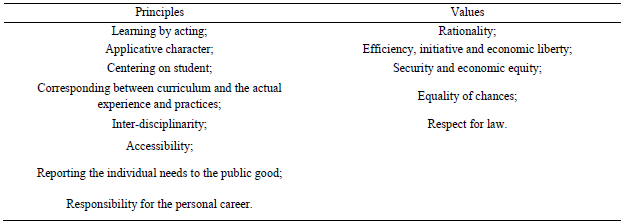
level of the educational politics and projects in the last decades. According to the Gender Barometer
made by the Open Society Foundation in 2000, 74% of the youth with ages between 18 and 29
considered that man is the head of the family, and an average of 63% of the Romanians considered that
it was rather the women’s duty to fulfill the domestic chores, more than then men (Barometrul de gen,
2000).
The Romanian educational system, taking into account the content that can be found in the school
manuals and sometimes by the used didactic strategies, prescribes gender models regarding the
individuals’ social integration and professional evolution. The approach of the gender education, in the
Romanian school, is also accomplished within some non-formal activities or circumscribed to the
curricular area named
equality regarding the social and professional roles; avoiding the stereotypes and preconceptions
referring to gender dimension; the adequate management of some situations which involve
discrimination on gender criteria etc. At the level of the Science disciplines, we may speak of a gender
education regarding the orientation towards certain professional fields in which prevail the male or
female gender.
different health status and of teaching attitudes and skills that are indispensable for a responsible and
healthy behavior. In the Romanian school, Education for health is accomplished either as optional,
separate discipline, either by inserting some specific themes or modules among the contents of some
disciplines like: Learning environment, Counseling and orientation, Sciences, Biology or Chemistry.
The objectives of the education for health are: to promote the students’ health and wellbeing - optimal
functioning from somatic, physiologic, cognitive, emotional, social and spiritual perspective;
promoting a healthy life style; contributing to the students’ personal development based on: self-
knowledge, construction of a personal positive image, adequate communication and interpersonal
relation, stress control and harmonious development of the personal career; accomplishment of
preventive actions reported to: prevention of accidents and behaviors presenting health risks;
prevention of the personal negative attitude, and more generally, the personal life; prevention of
interpersonal conflicts and social disadaptation, but also of different crisis situations. (MEC, CNC,
2004)
Methodology

The results obtained after applying the questionnaire were processed based on the statistical-mathematic analysis and they were subsequently correlated with the results obtained from the focus-group discussions.
Results and discussion
The three items that analyzed the measure in which the economic education field is approached
during the Sciences classes were: to understand the economic aspects, to know the reasons of the
poverty degree in Romania and to know the reasons of the poverty degree in the world. As we can see
in the chart below (figure
been approached during the classes of Sciences. Starting from those factual data, we may appreciate
that in Romania the present curriculum for the disciplines which are part of the category of Sciences
(Chemistry, Physics and Biology) could be restructured in accordance with the economic nature issues
that are in direct or indirect connection with the physical, chemical or biological processes from nature
and from everyday life.
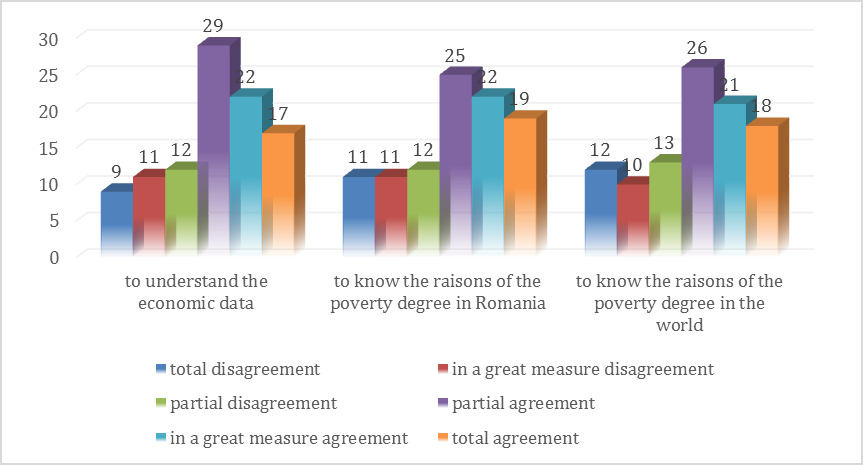
Concerning the entrepreneurial education, especially reported to the choice of a future profession,
the students expressed their opinions reported to the following aspects: to be prepared about the aspects
involved by the occupations/professions that require a formal training, to know the main attributions of
the occupations/professions that require a formal training, to know what qualifications are needed in
different occupations/professions. The data gathered after the statistical-mathematical processing of the
answers offered by the 1048 respondents (Fig. 2) demonstrate that during the Sciences classes, the most
often approached aspect is the one regarding the necessary qualification for the different professions.
From the direct discussions with the students, we found out that the general focus is on the professional
areas with direct connection with Sciences, such as Science researcher or teacher. Moreover, we
observe a quite reduced preoccupation of the Sciences teachers for presenting the positive or negative
implications of each profession and of the professional’s attributions in a certain field.
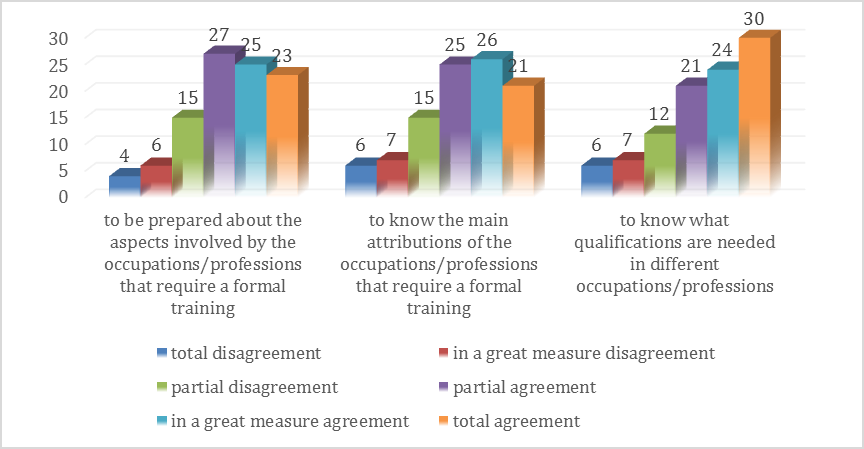
Concerning the gender education, the students expressed their opinions concerning a series of
aspects like: to know what the society expects from one person (man or woman), to know what options
he/she has within the society as a man or woman, to know what options he/she has, as a man or
woman, for the career. As we can see the answers, at all the three items register an ascendant curve
(Fig.3), most of the students expressing their total agreement regarding the accomplishment of those
aspects during the Sciences classes. We appreciate that the answers may be justified also by the fact
that the actual Romanian society is one in which the ancient gender habits are better and better
surpassed and, in Sciences, the women’s degree of representativeness is very significant.
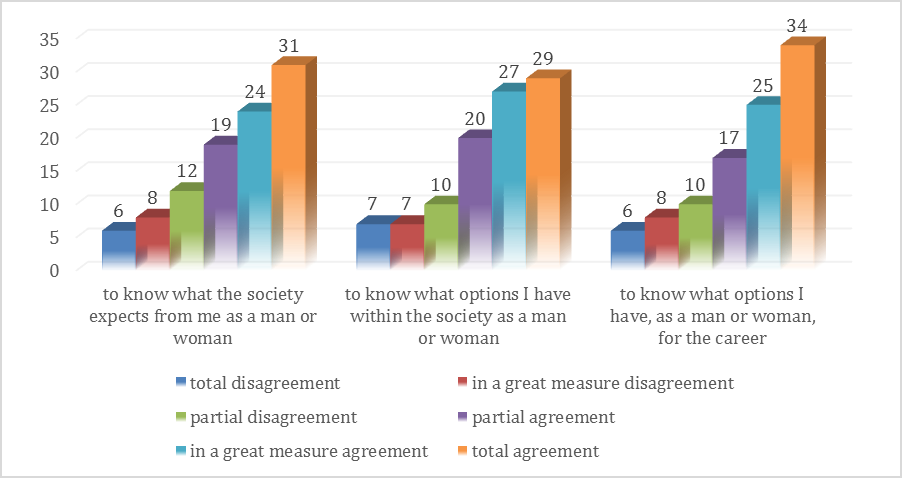
Education for health is the best represented aspect in the context of the Sciences classes. The
students expressed their opinions for the following items: to know what the body needs in order to stay
healthy, to know what may alter the health status and to understand the processes that take place in the
human organism. Most of the students’ answers are structured on the highest levels of the measuring
scale (in a great measure agreement and total agreement) (Fig. 4). From the discussions with the
students we concluded that those themes are approached especially during the classes of Biology (in
distinguish modules) and even Chemistry, but less in the classes of Physics.
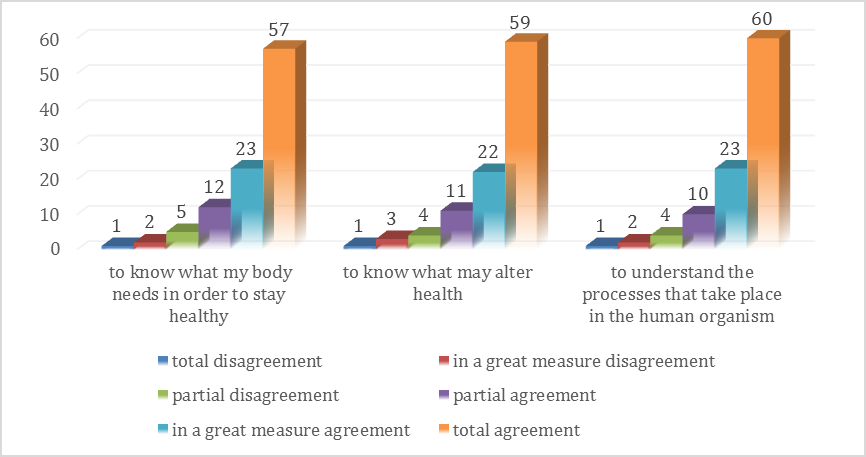
Conclusions
The obtained results prefigured the idea according to which an insertion of the specific contents of
new educations within the curriculum for Sciences (Physics, Chemistry, Biology) enhances their
attractiveness and potentiate the students’ motivation for learning.
Acknowledgements
This work was funded through the Seventh Framework Programme “
SiS-2010-2.2.1, Grant Agreement No. 266589, Supporting and coordinating actions on innovative
methods in Science education: teacher training on inquiry based teaching methods on a large scale in
Europe. The support offered by the European Commission as well as the Community Research and
Development Information Service as responsible for the management of EU’s programmes in the fields
of research and innovation, through the project mentioned above, is gratefully acknowledged.
References
- *** (2000). Barometrul de gen 2000. Available online at: http://www.fundatia.ro/barometrul-de-gen-2000 Cristea, S. (2010). Fundamentele pedagogiei. Iaşi: Polirom.
- Ministerul Educaţiei al Republicii Moldova (2013). Educaţie Economică şi Antreprenorială. Curriculum pentru învăţămîntul primar (clasele I – IV). Available online at: http://www.jamoldova.org.md/images/DOC/Curriculum_CicluPRIMARF.pdf Ministerul Educaţiei şi Cercetării, Consiliul Naţional pentru Curriculum (2004). Programe şcolare revizuite pentru disciplina opţională Educaţie pentru Sănătate. Available online at: http://www.edu.ro/download/edsan112.pdf
Copyright information

This work is licensed under a Creative Commons Attribution-NonCommercial-NoDerivatives 4.0 International License.
About this article
Publication Date
04 October 2016
Article Doi
eBook ISBN
978-1-80296-014-3
Publisher
Future Academy
Volume
15
Print ISBN (optional)
-
Edition Number
1st Edition
Pages
1-1115
Subjects
Communication, communication studies, social interaction, moral purpose of education, social purpose of education
Cite this article as:
Petrescu, A. A., Drăghicescu, L. M., & Stăncescu, I. (2016). Valorization of Specific New Educational Contents in Science Lessons. In A. Sandu, T. Ciulei, & A. Frunza (Eds.), Logos Universality Mentality Education Novelty, vol 15. European Proceedings of Social and Behavioural Sciences (pp. 741-747). Future Academy. https://doi.org/10.15405/epsbs.2016.09.94

